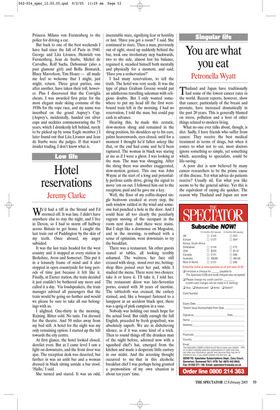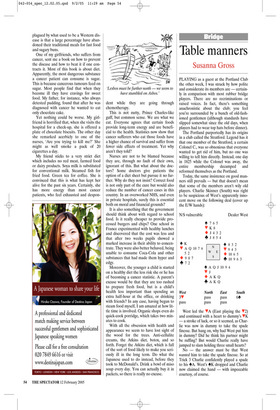You are what you eat
Petronella Wyatt
Thailand and Japan have traditionally had some of the lowest cancer rates in the world. Recent reports, however, show that cancer, particularly of the breast and prostate, have increased dramatically in the past 20 years. This is generally blamed on stress, pollution and a host of other things related to modern living.
What no one ever talks about, though, is diet. Sadly, I have friends who suffer from cancer. They receive the best medical treatment in terms of drugs, but when it comes to what not to eat, most doctors ignore something so simple, yet something which, according to specialists, could be life-saving.
A poor diet is now believed by many cancer researchers to be the prime cause of this disease. Yet what advice do patients receive? Usually nil. Eat what you like seems to be the general advice. Yet this is the equivalent of saying die quicker. The reason why Thailand and Japan are now plagued by what used to be a Western disease is that a large percentage have abandoned their traditional meals for fast food and sugary buns.
One of my girlfriends, who suffers from cancer, sent me a book on how to prevent the disease and how to beat it if one contracts it. Most of this book is about diet. Apparently, the most dangerous substance a cancer patient can consume is sugar. This is because cancerous tumours feed on sugar. Most people find that when they become ill they have cravings for sweet food. My father, for instance, who always detested pudding, found that after he was diagnosed with cancer he wanted to eat only chocolate cake.
Yet nothing could be worse. My girlfriend is horrified that, when she visits the hospital for a check-up, she is offered a plate of chocolate biscuits. The other day she remarked acerbicly to one of the nurses, ‘Are you trying to kill me?’ She might as well smoke a pack of 20 cigarettes a day.
My friend sticks to a very strict diet which includes no red meat, farmed food or dairy products. Soya milk is substituted for conventional milk. Steamed fish for fried food. Green tea for coffee. She is convinced that this is what has kept her alive for the past six years. Certainly, she has more energy than most cancer patients, who feel exhausted and despon dent while they are going through chemotherapy.
This is not nutty, Prince Charles-like guff, but common sense. We are what we eat. Everyone agrees that certain foods provide long-term energy and are beneficial to the health. Statistics now show that cancer sufferers who eat those foods have a higher chance of survival and suffer from fewer side effects of treatment. Yet why aren’t they told?
Nurses are not to be blamed because they are, through no fault of their own, ignorant of this. But what about the doctors? Some doctors give patients the option of a diet sheet but pursue it no further. Why do they not insist? Correct food is not only part of the cure but would also reduce the number of cancer cases in this country. In an overworked NHS, and even in private hospitals, surely this is essential both on moral and financial grounds?
It is also something that the government should think about with regard to school food. Is it really cheaper to provide processed burgers and chips? One school in France experimented with healthy lunches and discovered that the cost was less and that after two weeks pupils showed a marked increase in their ability to concentrate. They were also better behaved, being unable to consume Coca-Cola and other substances that had made them hyper and edgy.
Moreover, the younger a child is started on a healthy diet the less risk she or he has of becoming a cancer statistic. A parent’s excuse would be that they are too rushed to prepare fresh food, but is a child’s health less important than spending an extra half-hour at the office, or drinking with friends? In any case, having begun to steam food myself, I am amazed at how little time is involved. Organic shops even do quick-cook porridge, which takes two minutes to cook.
With all the obsession with health and appearance we seem to have lost sight of the wood for the trees. Anti-cellulite creams, the Atkins diet, botox, and so forth. Forget the Atkins diet, which is full of the sort of food likely to make you seriously ill in the long term. Do what the Japanese used to do instead, before they took to McDonald’s. Drink a bowl of miso soup every day. You can actually buy it in packets, so there is really no excuse.














































 Previous page
Previous page